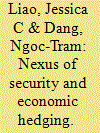|
|
|
Sort Order |
|
|
|
Items / Page
|
|
|
|
|
|
|
| Srl | Item |
| 1 |
ID:
167328


|
|
|
|
|
| Summary/Abstract |
The policies of Going Out and Good Neighbor have worked in tandem to direct Chinese diplomacy toward Southeast Asia over the past decades. This article asks how these policies have shaped Chinese energy and mining firms’ business decisions in the region. Using a combination of quantitative and qualitative data, this article argues that while Going Out and Good Neighbor have contributed to the growth of China’s energy and mining development projects in Southeast Asia, this outcome is not merely the result of a state-directed initiative. The growth is also driven by Chinese state-owned firms that take advantage of Beijing’s policy agenda and the institutional shortcomings behind it to plow state-backed resources into business partnerships with weak rule-of-law governments in the region. These partnerships and the associated projects are often touted as an arm of Chinese diplomacy, emboldening these firms to make risky expansion. Moreover, market, diplomatic, social, and geographic factors inherent to Southeast Asia further catalyze Chinese firms’ risky business practices while at the same time Beijing, prioritizing diplomatic relations over good governance, has been slow to police problems stemming from its firms’ dubious partnerships. In the end, this situation has hurt China’s image, contrary to Good Neighbor’s intended objectives.
|
|
|
|
|
|
|
|
|
|
|
|
|
|
|
|
| 2 |
ID:
172132


|
|
|
|
|
| Summary/Abstract |
Hedging has been a widely discussed concept in explaining East Asian states’ counteracting policies in the face of great power competition. However, the current literature has yet to specify how hedging responds to great power competition in economic statecraft, namely, using economic means to influence other states. This paper examines Vietnam’s response to Japan and China’s infrastructure financing programs over the past three decades. Through a combination of quantitative and qualitative data, it explains how Vietnam, while following economic pragmatism, does not simply aim to maximize gains from these two powers. Vietnam’s decisions embody what we call economic hedging, or a cautious calculation over the linkage between security risks and infrastructure partnership and a tendency to pivot away from infrastructure partners deemed risky, namely, China. It also shows that such caution has intensified in the face of a nationalistic public that has challenged the notion of economic pragmatism, pushed a realist approach to economic relations with China, and bolstered Hanoi to take more action to protect Vietnamese sovereignty from Chinese economic influence. The convergence of these domestic and international trends have driven Hanoi to enhance collaboration with Japan, which it views as an increasingly important strategic partner.
|
|
|
|
|
|
|
|
|
|
|
|
|
|
|
|
| 3 |
ID:
192161


|
|
|
|
|
| Summary/Abstract |
As clean energy policy becomes a pressing need in the wake of the looming climate crisis, the world—especially developing Asia—has witnessed a conflicting trend throughout the 2010s, that is, the boom of coal-fired power development. This article argues that the geoeconomic significance, driven by not only China’s but also Japan and South Korea’s pursuit of national interests, intensified a competition among them in supporting overseas coal fired power financing and has contributed to this phenomenon. Using a mix of qualitative and quantitative data, it illustrates that while coal power financing becomes a conduit for these three ‘developmental states’ to forge comprehensive relations with countries they deem strategically important, the effectiveness of using this conduit is contingent, and constrained by exogenous factors, particularly dynamics of global energy markets.
|
|
|
|
|
|
|
|
|
|
|
|
|
|
|
|
| 4 |
ID:
185232


|
|
|
|
|
| Summary/Abstract |
This article examines the evolution of China-ASEAN environmental and energy cooperation since the 2010s with a focus on changes following the launch of the Belt and Road Initiative (BRI). It shows that over the past decade China and ASEAN have actively expanded cooperative frameworks and mechanisms in the domain of environmental protection as part of their comprehensive approach to sustainable development, particularly regarding energy projects. Nonetheless, the implementation record in their energy cooperation, that is, the lion’s share of BRI projects in Southeast Asia, remains unsustainable and contradicts with their shared “green” policy discourse. The article examines factors from both sides of China and ASEAN that contribute to this disconnect and explains why China’s own accomplishments in renewable energy development fail to spill over to Southeast Asia. These findings have implications for China’s impact on global governance and its leadership role in the Global South.
|
|
|
|
|
|
|
|
|
|
|
|
|
|
|
|
|
|
|
|
|